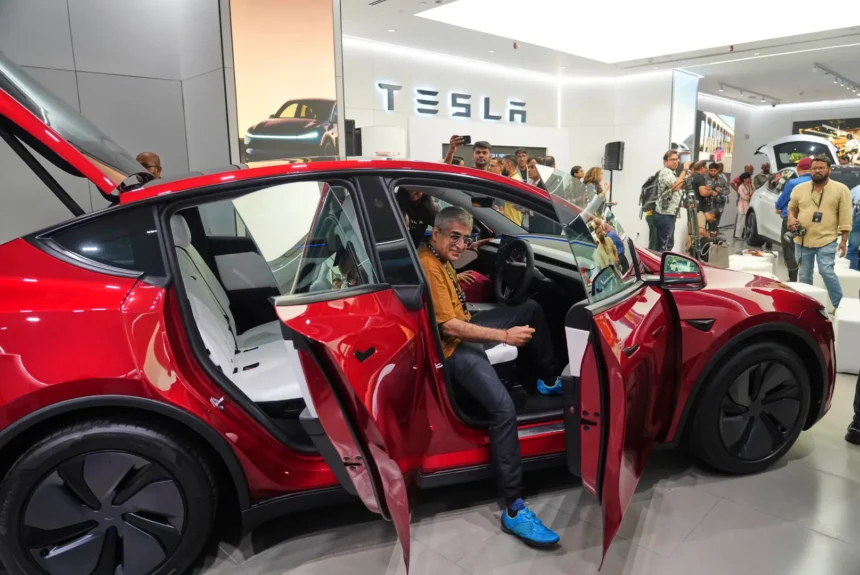MUMBAI – Tesla India has made its official entry into India, launching its first showroom in Mumbai’s upscale Bandra Kurla Complex at Maker Maxity Mall. This new 4,000-square-foot “Experience Centre,” opened by Maharashtra Chief Minister Devendra Fadnavis on July 15, signals Tesla’s arrival in the world’s third-largest car market.
A second showroom will open soon in Delhi’s Aerocity, as Tesla aims to attract India’s luxury electric vehicle buyers. High import taxes and a lack of charging stations remain tough hurdles.
This expansion is part of Tesla India’s strategy to tap into the growing demand for electric vehicles in the region.
Designed by architect Neeta Sarda, the Mumbai showroom does more than showcase cars. It shows Tesla India’s goal to change how people see mobility in India. The space features the Model Y, Tesla’s electric SUV, available in Long-Range Rear-Wheel Drive and All-Wheel Drive versions. Prices start at ₹59.89 lakh (about $70,000) and ₹61 lakh.
The more affordable Model 3 is also displayed, but won’t be available for sale until late 2025. Six Model Y vehicles, shipped from Tesla’s Shanghai plant, are ready for test drives. Deliveries should begin by late August or September.
The opening event brought in car fans, industry insiders, and officials. Fadnavis encouraged Tesla to consider Maharashtra for future research, development, and manufacturing. He described Tesla as a symbol of innovation and sustainability, highlighting Maharashtra’s support for electric vehicles and charging network incentives.
Tesla India Game Plan: Premium Focus
Tesla’s move comes as it faces slowing sales in the US and Europe. With electric vehicles making up only 2.3% of India’s 2024 car sales, Tesla targets well-off city buyers. Its main competition in India is luxury brands like BMW and Mercedes-Benz, not local companies such as Tata Motors or Mahindra & Mahindra.
Model Y prices in India reflect high import taxes, with a 70% duty on fully built EVs under $40,000. This drives Indian prices much higher than in other countries. For comparison, the Model Y starts at $44,990 in the US, $36,700 in China, and $53,700 in Germany. In India, import duties add over ₹21 lakh to the cost of each car.
Despite higher costs, Tesla expects its reputation and advanced technology to win over India’s wealthy customers. The company has also leased a service centre in Kurla West and set up a temporary office near BKC, showing its commitment to ongoing support. With an engineering hub in Pune and a registered office in Bengaluru, Tesla is laying the groundwork for a larger presence.
India’s Electric Car Scene: Growth and Obstacles
India’s electric vehicle market is growing, helped by government support and plans to reach 30% EV sales by 2030. Recent cuts to import duties have made it possible for Tesla to enter. But challenges remain. Limited charging spots, high upfront prices, and a consumer preference for petrol and diesel cars slow the adoption.
Analyst Soumen Mandal expects Tesla’s early sales to be between 500–700 cars a month, possibly dropping to 200–300 as the newness fades, due to high prices and charging issues.
Tesla faces competition from German luxury brands, Chinese EV maker BYD (which sells the Sealion 7 at ₹48.90 lakh), and Tata Motors, which leads the budget EV market. Vietnamese company VinFast is also growing its presence, and Kia’s new Carens Clavis offers a 490km range at ₹17.99 lakh.
After Mumbai, Tesla will open a similar-sized showroom in Delhi’s Worldmark complex in Aerocity, a top business area close to Indira Gandhi International Airport. The lease, reportedly at ₹25 lakh per month, shows Tesla’s focus on high-profile locations to boost its brand image. The company is also considering showrooms in cities like Bengaluru as it checks customer demand.
A New Chapter for Electric Cars in India?
Tesla does not plan to build cars in India yet. Union Heavy Industries Minister H.D. Kumaraswamy confirmed that Tesla’s current focus is on sales rather than production. Talks are ongoing with the Indian government about setting up assembly plants to help lower future prices. Meetings between CEO Elon Musk and Prime Minister Narendra Modi this year, both in the US and by phone, have increased talk of deeper cooperation in technology.
Tesla’s arrival is a big step for India’s electric vehicle market, bringing advanced technology and raising the standard for premium EVs. But with high prices and reliance on imports, Tesla’s reach may stay limited to a wealthy niche. As one industry expert put it, Tesla adds prestige and excitement, but to win over more Indian buyers, it will need more affordable cars and local production.
For now, the Mumbai showroom stands as Tesla’s first big move in India, letting local buyers experience its vision for clean, electric driving. With test drives starting and first deliveries on the horizon, many are watching to see how Tesla adapts to India’s unique market and whether it can spark wider interest in electric vehicles.














